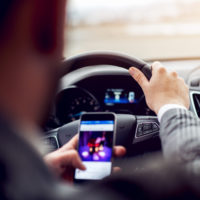HANDS OFF THE CELL PHONE AND ON THE WHEEL – THAT’S THE LAW!

It’s a fact: No state bans all cell phone use for all drivers.
However, as the National Conference of State Legislatures notes, 14 states, D.C., Puerto Rico, Guam, and the U.S. Virgin Islands do prohibit all drivers from using hand-held cell phones while driving. Also a fact, but a bit more encouraging, is that 47 states (plus D.C., Puerto Rico, Guam, and the U.S. Virgin Island) ban text messaging for all drivers.
One important distinction is “primary enforcement” vs. “secondary enforcement”. In states with primary enforcement (Indiana is one), an officer can pull you over for using a handheld cell phone without any other reason for the stop. With “secondary enforcement”, the officer must have another reason for pulling you over (such as speeding, running a red light, or driving with no signal lights) and only then is that officer able to cite you for a cell phone infringement.
Where does Indiana fall in this distracted-driving-by-cell-phone prevention picture?
- Primary enforcement
- Texting ban for all drivers
- All cell phone ban applies to drivers under the age of 21
Does banning texting while driving make a difference? That was a question discussed by CBS News two years ago, after a report published in the American Journal of Public Health indicated that bans on texting while driving may in fact be preventing some serious traffic accidents. Specifically, in states where texting bans were “primarily enforced”, hospitalizations for travel accidents went down.
In our work as personal injury attorneys, the fact that Indiana is a “fault” state becomes very important when we represent someone hurt in an auto accident. In “no fault” states such as Kentucky, each driver’s insurance will typically pay for his or her own injuries, regardless of who was at fault for the accident. Indiana law, however, holds each driver accountable for his or her role in the accident, assigning a percentage of fault to each driver.
So, if witnesses testify (or it is otherwise discovered) that one of the drivers was texting or talking on a hand held phone immediately prior to the accident, a large percentage of the fault, if not all of it, will probably be assigned to that driver. (As you may imagine, even though that driver’s insurance company will pay the bills, it’s not likely they will continue to keep him/her as a customer!)
It’s a fact: Hands off the cell phone and on the wheel – that’s the law!




